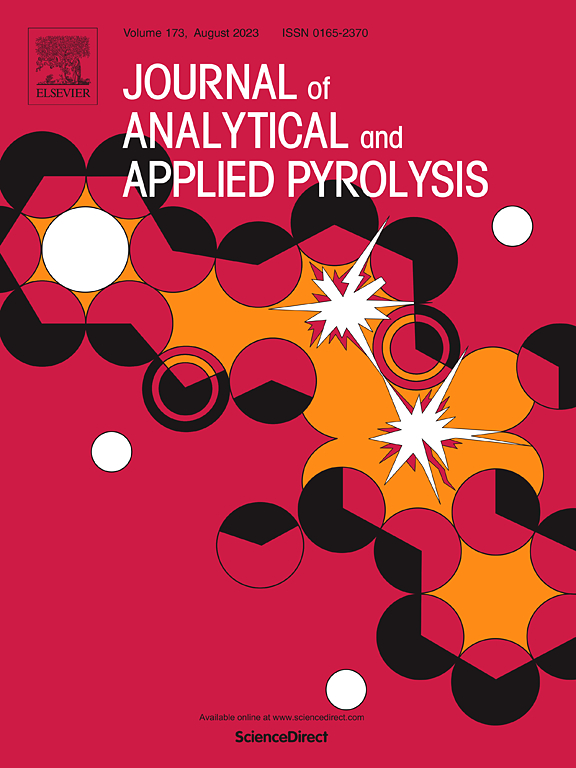松木木屑与聚烯烃固体热载体共热解:回转窑协同脱氧及高产烃生产
IF 6.2
2区 化学
Q1 CHEMISTRY, ANALYTICAL
引用次数: 0
摘要
化石燃料的全球耗竭要求生物质能和塑料废物的有效增值。研究了松木木屑(PS)与聚烯烃(聚乙烯、聚乙烯、聚丙烯、PP)在回转窑中的固体热载体共热解,以提高生物油的生产效率。热降解行为和动力学分析揭示了显著的协同作用:熔融聚烯烃渗透到生物质基质中,促进氢自由基转移,抑制含氧化合物(如酚类、呋喃类),增强碳氢化合物的形成。以固体热载体参数(570°C, 8 %填充率,0.45 mm粒径)优化热解后,PS的生物油收率最高(43.1 wt%)。与PE或PP以1:2的比例共热解,生物油收率进一步提高至53.3 wt%,同时含氧化合物减少超过70 %,显著富集脂肪烃(PE为81.2 %,PP为78.4% %)。有效氢碳比控制了烃类的选择性,产率为30.7-32.4% (C8-C23),适用于喷气/柴油燃料。由于C₂-C₄烃(45.2 vol%)的协同生成,气体热值飙升至31.6 MJ/m³ 。该过程的强化主要是由聚烯烃的传热增强和给氢体塑性驱动的,为后续利用功能化固体热载体进行原位催化共热解的研究奠定了基础平台。这项工作验证了与固体热载体共热解作为从生物质和塑料废物中生产高价值生物油的技术可行途径。本文章由计算机程序翻译,如有差异,请以英文原文为准。
Co-pyrolysis of pine sawdust and polyolefin with solid heat carrier: Synergistic deoxygenation and high-yield hydrocarbon production in rotary kiln
The global depletion of fossil fuels necessitates the efficient valorization of biomass and plastic wastes. This study investigates the co-pyrolysis of pine sawdust (PS) with polyolefins (polyethylene, PE; polypropylene, PP) using a solid heat carrier in a rotary kiln to intensify bio-oil production. Thermal degradation behaviours and kinetic analyses revealed significant synergistic interactions: molten polyolefins permeated the biomass matrix, facilitating hydrogen radical transfer that suppressed oxygenated compounds (e.g., phenolics, furans) and enhanced hydrocarbon formation. Optimized pyrolysis with solid heat carrier parameters (570 °C, 8 % filling ratio, 0.45 mm particle size) maximized bio-oil yield (43.1 wt%) from PS. Co-pyrolysis with PE or PP at a 1:2 ratio further increased the bio-oil yield to 53.3 wt%, while reducing oxygenated compounds by over 70 % and significantly enriching aliphatic hydrocarbons (81.2 % with PE; 78.4 % with PP). The effective hydrogen-to-carbon ratio governed hydrocarbon selectivity, yielding 30.7-32.4% (C8–C23) alkanes suitable for jet/diesel fuels. The gas calorific value surged to 31.6 MJ/m³ due to the synergistic generation of C₂–C₄ hydrocarbons (45.2 vol%). The process intensification, primarily driven by enhanced heat transfer and hydrogen-donor plasticity of polyolefins, establishes a foundational platform for subsequent studies on in-situ catalytic co-pyrolysis using functionalized solid heat carriers. This work validates co-pyrolysis with a solid heat carrier as a technically viable route for producing high-value bio-oil from biomass and plastic wastes.
求助全文
通过发布文献求助,成功后即可免费获取论文全文。
去求助
来源期刊
CiteScore
9.10
自引率
11.70%
发文量
340
审稿时长
44 days
期刊介绍:
The Journal of Analytical and Applied Pyrolysis (JAAP) is devoted to the publication of papers dealing with innovative applications of pyrolysis processes, the characterization of products related to pyrolysis reactions, and investigations of reaction mechanism. To be considered by JAAP, a manuscript should present significant progress in these topics. The novelty must be satisfactorily argued in the cover letter. A manuscript with a cover letter to the editor not addressing the novelty is likely to be rejected without review.

 求助内容:
求助内容: 应助结果提醒方式:
应助结果提醒方式:


